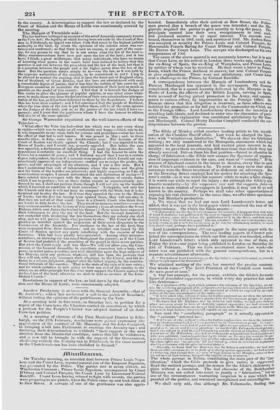At On Tuesday morning, an intended duel between Prince Louis
Napo- leon and the Count Leon, reputed natural son of the Emperor Napoleon, was prevented by the Police. The parties met at seven o'clock, no Wimbledon Common ; Prince Louis Napoleon, accompanied by Count D'Orsay and Colonel Parquin, the Count Leon by Lieutenant-Colonel Ratcliffe. Count Leon having refused to fight with swords, the parties were preparing to use pistols, when the Police came up and took them all to Bow Street. A servant of one of the gentlemen was also appre- hended. Immediately after their arrival at Bow Street, the Police- man proved that a breach of the peace was intended ; and the Ma. gistrate required the parties to give security to keep the peace. The principals entered into their own recognizances in 500/, each and produced sureties to an equal amount. The seconds were' bound, themselves in 100/. each, and sureties of 100/. Mr. Joshua Bates was accepted as security. for Prince Louis and Colonel Parquin, the Honourable Francis Baring for Count D'Orsay and Colonel Paquin Mr. Fenton for Count Leon. The servant was discharged on his owl; recognizance of 100/.
The cause of the above quarrel is not accurately known; but it is said that Count Leon, on his arrival in London three weeks ago, called upon the ex-King of Spain, the ex-King of Westphalia, and Prince Louis, by neither of whom was he received. He then wrote a letter to Prince Louis, which the Prince declined to answer, but sent Colonel Par quill to give explanations. These were not satisfactory, and Count Leen sent a challenge to the Prince, by Colonel Ratcliffe.
A correspondence between the Marquis of Londonderry and Sir Duncan Macdougall has appeared in the newspapers. Sir Duncan complained, that in a speech recently delivered by the Marquis in the House of Lords, the officers of the British Legion, serving in Spain, were accused of having gained promotion in the Army, and appoint. ments to various offices, by importunities at the Foreign Office, Siz Duncan shows that this allegation is incorrect, as those officers were indebted for promotion or for full pay to the Commander-in-Chief, not to the Foreign Office. Lord Londonderry disclaimed the intention of attacking individuals, and declined to enter into the discussion of parti- cular cases. His explanation was considered satisfactory by Sir Dun.
can Macdougall. Colonel Henry Dundas Campbell conducted the cos
-
respondence between the parties.


























 Previous page
Previous page